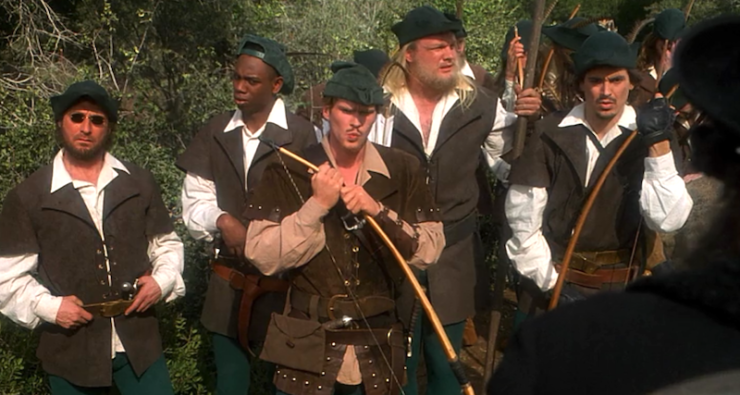In the earliest tales, Robin Hood was many things—gambler, fighter, braggart, gentleman, con artist, master of disguise—but he was never a nobleman.
Despite scholarly fights and centuries of material to choose from, no one has ever agreed on why this change became so popular. It may have been a desire to link the legendary bandit with a real live person (such as Fulk fitz Warin or Robert Hod), or fear that the poor folks of the world might read stories of Robin’s origin and start a rebellion of their own, or simply the novelty of a man displaced and still carrying on despite it all. No matter the cause, the version of Robin that we come across most often is a figure of privilege. He’s an earl or a member of the landed gentry. He’s in the forest for now, while he waits for the rightful king and the restoration of his lands and position. With very few exceptions, modern Robin Hood stories are about a rich dude who is briefly less rich, and thankfully doesn’t hate poor people.
Moreover, Robin Hood’s position as a “hero for the people” has always been one of the most aggressively contested aspects of his character. Over the centuries, the tale has been rewritten and reinterpreted countless times, leading to confusion about Robin’s true origins and motivations. The question of which aspects to favor when piecing together the long arc of the tale’s history are never in agreement, in part because there is so little information about the earliest stories. When you add politics in to the mix, things get even more awkward: one scholar contends (J.C. Holt, 1982) that the gentry are responsible for keeping the story alive and growing, so Robin Hood cannot possibly be a figure of plebeian rebellion; another scholar (Jeffrey L. Singman, 1998) insists that Robin Hood is a subversive figure, and an enemy of serfdom and feudalism. Where some see a figure of dissent and resistance, others find a vehement enabler of the status quo who just likes a good laugh.
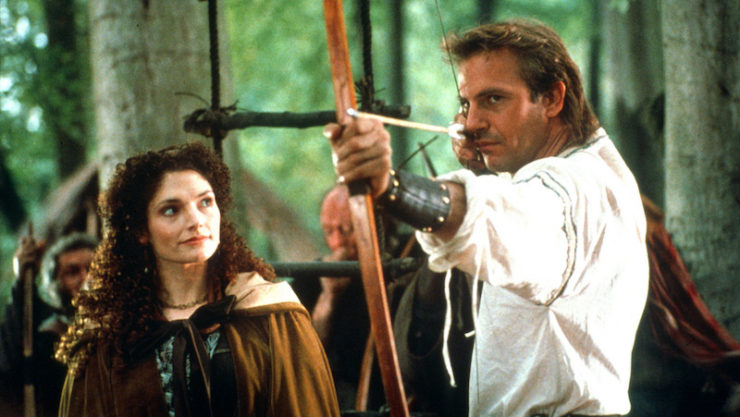
When it comes right down to it, the root of this constant argument is simple: people want the outlaw of Sherwood Forest to belong to them, to their own ideologies. Following Ridley Scott’s Robin Hood, there were arguments that this pseudo-historical Robin would have been a member of the Tea Party (Jared Keller, 2010), or that he was clearly a libertarian (, 2012). During the era of McCarthyism, Robin Hood was banned from textbooks (Alison Kysia, 2013) in the United States for “promoting communism” with its rob-from-the-rich-give-to-the-poor schtick. If you were to ask me over friendly pints at a bar, I’d tell you without hesitation that Robin Hood and the Merry Men in Sherwood Forest are a gay socialist utopia that the world needs to embrace. But none of these interpretations can encompass the entirety of the legend. It is simply too vast and too long-lived.
But in recent memory, this is the story we are most likely to recognize:
There is a band that lives in Sherwood Forest and they rob from the rich and give to the poor.
They do this because the good king is away, and his little brother was left to rule in his place. The prince is an idiot and he surrounds himself with monstrous men, and he demands everything of his people. He taxes his citizenry bare and tells them that it is good for them. He sits on their gold like a great dragon and portends to virtue while they starve. He ignores their pleas for help and acts surprised when there is unrest in his country.
Never fear! Everything will be all right. A dispossessed nobleman is here to stop the prince and his lackeys. He brought friends to aid him in this national hour of need.
That tendency toward making Robin Hood a nobleman who robs from people just like him—it smudges the image up, like grit on a lens. The very idea has a disingenuous sheen to it, or worse, a heavy aura of wishing thinking: Wouldn’t it be great if there was one super nice wealthy person who would make the rest of the wealthy people hand over their money and take care of the poor and needy around them? Wouldn’t it be even greater if he could alleviate them of said wealth in a comical fashion so that the concept of class warfare and potential revolution didn’t seem nearly so serious? Hollywood is failing us, and so are a multitude of current adaptations. It’s akin to making every female Disney lead a princess; every Robin Hood must come with a title and a patch of land that a mean sheriff or haughty prince can commandeer. It’s lazy storytelling, and worse for the fact that it has nothing to do with origin of the figure.
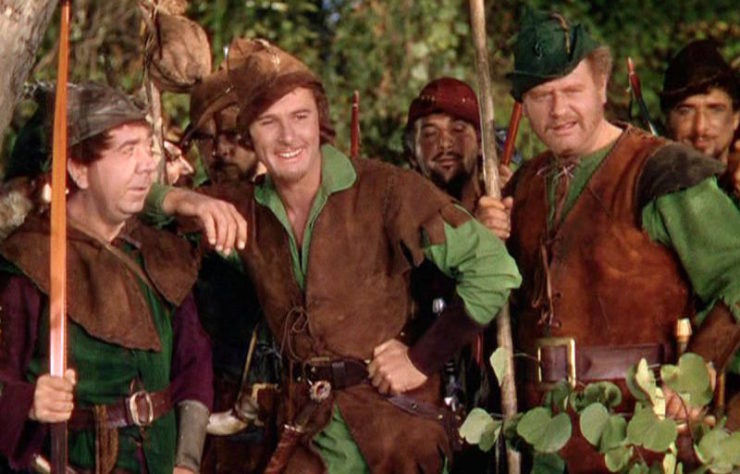
Contextually, the root of Robin Hood’s character and popular elements of his story come from a likely multitude of sources as the legend was being built over the 13th and 14th centuries. Robin Hood was a member of the middle class at a time when chivalry was the rule of the day—and civil unrest was, too. The earliest known stories contain no record of him robbing the rich and giving over the plunder to peasants, but they do make mention of him being a “good” outlaw who helped poor men. He became king of the May Day festivities by 15th century, where Maid Marion also became a popular mainstay of his story. The Historia Majoris Brittaniae of 1521 was responsible for tying Robin Hood rather permanently to King Richard and the Crusades. The earliest known source that mentions his nobility is Anthony Munday’s The Downfall and The Death of Robert Earl of Huntington, a series of plays published in 1601.
Still, nobility was not a common feature of Robin Hood stories until Joseph Ritson published a work called Robin Hood: A collection of all the Ancient Poems Songs and Ballads now extant, relative to the celebrated Outlaw in 1795. In this work, which attempted to reassert the medieval version of the figure (who had been somewhat displaced by more comical ballads in the 18th century), Ritson did some dubious detective work into the potential truth of Robin Hood as a living human being, concluding that he was a real man named Robert Fitzooth. Pointedly, Robert Fitzooth was not a real man—he was likely an invention of William Stukeley, who created Fitzooth and his family tree for Paleographica Britannica (1746). As we can see, the evidence Ritson used was beyond wobbly; it seems that in an effort to become to foremost Robin Hood scholar in the world, he was determined to make the outlaw real by any means necessary, even citing fiction (such as Munday’s plays) in his argument for Robin Hood’s historical presence. Even so, his work is still one of the most influential in the character’s history, and Ritson’s pal Sir Walter Scott referenced this mighty tome in creating his own version of Robin Hood for Ivanhoe—itself an incredibly popular and influential book.
Ritson’s version of Robin Hood was meant to be a hero of the people, and Ritson himself was an advocate of the principles espoused by the French Revolution—obviously not very forgiving of the wealthy and privileged classes. But Ritson was unlikely to find records dating back to the 12th century for his “real life” Robin Hood among the annals of peasants or yeoman—and perhaps this is the key. Ritson’s champion of the common man became an aristocrat not because Ritson desired it, but because he was determined to offer up a historical Robin Hood, and records of the gentry were the only places where he could even attempt to establish lineage that others would take seriously. And though most earlier versions of the story did not grant Robin of Locksley (or of anywhere else) a sheen of nobility, this was the backstory that stuck. Films and television and many modern revisions, they can’t shake this rewrite, no matter how hard they try.
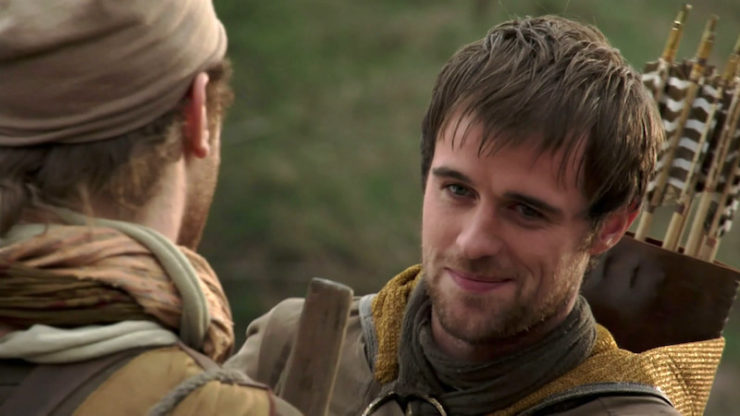
Most of the Robin Hoods you know embody this error. Errol Flynn is a nobleman and a Saxon fighting against the Normans. Douglas Fairbanks is the Earl of Huntingdon, who asks to return home from the Crusades in order to take the throne back from the king’s evil brother. Kevin Costner returns from the Crusades to find his father dead and his estate destroyed, but King Richard still blesses his marriage to Marian. Cary Elwes finds Loxley Hall repossessed when he arrives back in England. Russell Crowe pretends to be a nobleman throughout his misadventure because the concept is so ingrained that even a “realistic” version of the tale must abide. Television series Robin of Sherwood (1984) features two distinct noble born versions of Robin, and the BBC’s Robin Hood (2006) features their own Earl of Huntingdon running the Merry Men into Nottingham and back. Even Disney’s dashing fox is likely to be a nobleman—it’s highly unlikely that he would have been Marian’s childhood sweetheart if they weren’t both of the upper crust.
And still we must ask—why?
Why is it more appealing, more comfortable, more exciting to imagine Robin Hood as a rich fellow who forgoes his wealth to fight against a corrupt system? Why are we taken in and placated by a nobleman of charity and occasional good humor?
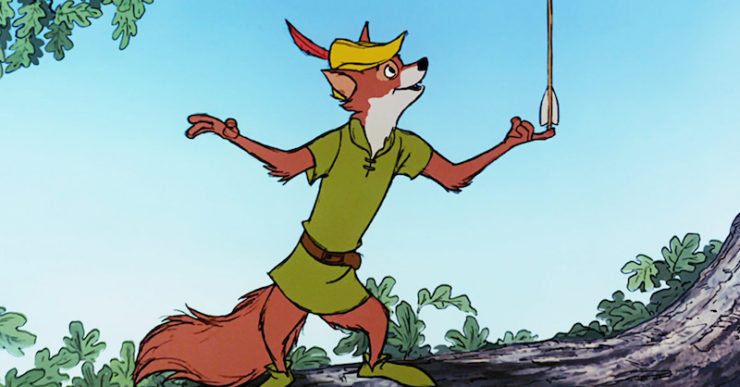
The truth is, our fictional halls of fame are lousy with this figure, this exact prototype. Think carefully and you will recognize him well: He is Batman. He is the Scarlet Pimpernel. He is Tony Stark. He is literally Green Arrow because that character was very obviously based on Robin Hood. Modern fiction wants us, needs us, to believe that this hero exists. And what’s more, we are not meant to merely tolerate this figure—we are supposed to love him. To demand more of him. To feel safer because he exists.
Which is ironic, given the unconscionable imbalance in the distribution of wealth and resources that we see today, and the incalculable greed of those who are lucky enough to have it.
Because the truth is far more painful to reckon with. There are a few figures of incredible means who go out of their way to provide for everyone else. Some may give to charity, create programs to get much-needed resources into the hands of those who need them, offer the world more energy-efficient cars. But they are not here to save us by any stretch of imagination. They do not hit the street day and night to fight crime, stop oppression, and keep monsters at bay. So we have created a fictional crew, like a table setting, to be laid out whenever this reality becomes too much. The Good Wealthy Men set. They have money and still care what happens to the destitute. Thank goodness someone does.
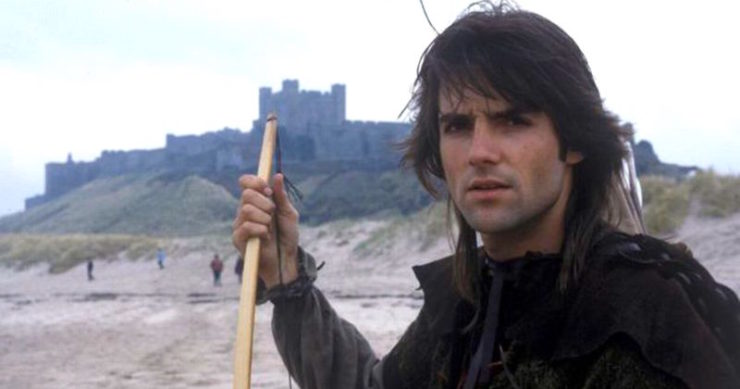
But Robin’s Hood real origin as an average man is the true inspirational plot, and one that likely brought comfort to the masses for centuries before that retrofitted narrative took hold. When the Forest Laws were still intact in England and hunting for food without paying a hefty fee could land you in prison, Robin Hood was there to stop the sheriff and his men from hauling you in. When chivalry was still the code that people were expected to abide by, Robin Hood was gallant and kind to those who needed aid. When the Peasant Revolt of 1381 was still fresh in the mind of the populace, Robin Hood showed people that there was hope beyond a life of serfdom and servitude, beyond poverty and isolation.
In Sherwood Forest, we look out for one another and no one is king.
The legend of Robin Hood may have been rewritten and overwritten by nobility, but it was a tale meant for everyone. Ridding ourselves of this ridiculous alteration not only revives the source material, it makes the story matter again. Robin Hood as the trust fund baby who decides to go live in the woods to prove a point is just another ad for the virtue of simple living. It’s Silicon Valley millionaires raising their own chickens, and start up gurus claiming to be as accessible as their low-level employees, and financially sound power couples making the choice to live according to tenets of minimalism because they can afford to do so. There is nothing genuine or meaningful about it.
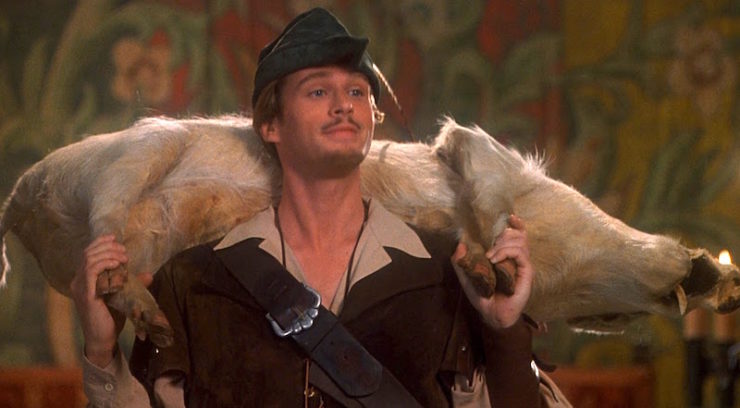
We deserve heroes who are doing real work to alleviate the suffering of others. Robin Hood of the gentry has had his day. He’s had a couple of centuries, in fact. If we’re going to keep telling this story over and over (and we will, because mythology tends to work that way), we may as well cherrypick the best pieces.
Sherwood Forest is ours. No one can wall it off, or chase us from it, or brand it with their name in big block letters. We are outlaws with bow and arrows, with rowdy friends, with disguises and songs. Robin Hood belongs to us all, not to a privileged few. It’s time he was returned.
Emmet Asher-Perrin is going to go have a quarterstaff fight on a bridge. You can bug her on Twitter and Tumblr, and read more of her work here and elsewhere.










